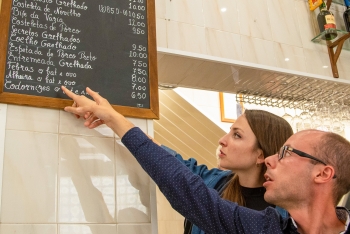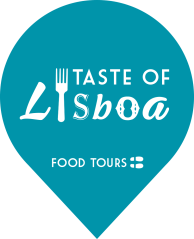Curso básico de português para viajantes gastronómicos

Na Taste of Lisboa adoramos apresentá-lo à nossa comida e cultura. Também lhe recomendamos que se misture com quem cá vive e explore ainda mais por conta própria. É por isso que organizamos um curso introdutório à língua portuguesa, especificamente adaptado para quem gosta de gastronomia: Aprenda a viajar pelo nosso país, a apresentar-se, pedir comida e verdadeiramente quebrar o gelo com os portugueses.
Se está a ler isto em português naturalmente já sabe falar a nossa lingua. Então pedimos que partilhe este post e nos ajude a ensinar português aos seus amigos estrangeiros e a outros membros da comunidade de viajantes amantes de comida.
Pois, embora muitos portugueses falem inglês e seja bastante fácil navegar no nosso país sem falar a lingua nativa, conhecer um pouco da língua do pais pode ajudar a levar a experiência ao próximo nível muito real quando os seus amigos nos visitarem. Não se trata apenas de se fazer entender; Trata-se também de quebrar o gelo com os portugueses e sentir-se um no meio de nós, conectar-se além do superficial, alimentar laços de amizade e até mesmo ser educado e agradecido.
É por isso que organizamos este curso introdutório para a língua portuguesa, especificamente adaptado para quem gosta de comida. Aprender a conviver, se apresentar, pedir comida e muito mais.
Obrigado por nos ler e partilhar!
CUMPRIMENTOS | GREETINGS

Olá – Hello
Bom dia – Good morning (We say it shortly after we wake up)
Boa tarde – Good afternoon (wWe say it shortly after lunch)
Boa noite – Good Night (We say it shortly after sunset)
Como está? – How are you?
Até já – See you soon
Até à próxima – See you next time
Até logo – See you later
Beijinhos – Kisses (Literally meaning little kisses, –inhos is a suffix we use for little cute things)
PERMISSÃO E AGRADECIMENTO | PLEASANTRIES

Por favor – Please
Obrigada/Obrigado – Thank you (this expression stems from the verb to be obliged. Therefore, it is dependent on the gender of the speaker. If you are a lady, you say obrigada. If you are a gentleman, you say obrigado)
Desculpe – I’m sorry
Com licença – Excuse me (Desculpe can also be used to ask to be excused, when passing through a big crowd, for example)
APRESENTAÇÕES |SELF INTRODUCTION

Eu sou – I am
Este/esta é…o meu/a minha – This is my… (o meu is masculine and a minha is feminine, typically in portuguese A is feminine and O is masculine, E is usually neutral. Of course there are exceptions.)
Filho/filha – Son/daughter
Marido/mulher – Husband/Wife
Irmão/Irmã – Brother/Sister
Pai/Mãe – Dad/Mom
Americano/Americana – American (Masculine/Feminine)
Inglês/Inglesa – English (Masculine/Feminine)
Canadiano/Canadiana – Canadian (Masculine/Feminine)
Alemão/Alemã – German (Masculine/Feminine)
Norueguês/Norueguesa – Norwegian (Masculine/Feminine)
Dinamarquês/Dinamarquesa – Danish (Masculine/Feminine)
Belga – Belgian (This one is gender neutral!)
Sueco/Sueca – Swedish (Masculine/Feminine)
Suíço/Suíça – Swiss (Masculine/Feminine)
MARCAR UMA MESA | BOOKING A TABLE

Queria reservar mesa para… pessoas – I would like to book a table for… people
Uma (pessoa) – 1 (Here we say uma pessoa - one person. Pessoa is the singular of pessoas – people)
Duas – 2 (Both um and dois – one and two – have male and female forms. Because pessoa is a feminine word, we must use the feminine form of each number. All other numbers are gender neutral)
Três – 3
Quatro – 4
Cinco – 5
Seis – 6
Sete – 7
Oito – 8
Nove – 9
Dez – 10
Vinte – 20 (After 20, it’s math. We say vinte e um - twenty and one. Trinta e dois - thirty and two. And so on…)
Trinta – 30
Queria reservar mesa para as… horas – I would like to book a table at… (time)
Uma (hora) – 1 (Here we say uma hora - one hour. Hora is the singular of horas.)
Duas e meia – 2h30 (Meia means a half)
Três e um quarto – 3h15 (Um quarto means a quarter to three)
Um quarto para as quatro – 3h45 (Um quarto para means that it’s missing a quarter of an hour to become a different hour.)
Hoje – Today
Amanhã – Tomorrow
Read more about the usual meal times in Portugal.
NO RESTAURANTE | AT THE RESTAURANT

Não tenho reserva – I don’t have a reservation
Tenho reserva em nome de… – I have a reservation in the name of…
Não posso comer… – I can not eat…
Sou alérgica/alérgico a… – I am allergic to… (If you have a really bad allergy to something, make sure to say this to your server. You can use both forms (não posso comer and sou alérgico a…) to express urgency. Feminine/Masculine
Amendoins – Peanuts
Nozes – Nuts
Malagueta – Chilli pepper
Lactose/Lacticínios – Lactose/Dairy
Glúten – Gluten
Sou vegetariano/vegetariana – I am vegetarian (Masculine/Feminine)
Sou vegan – I am vegan (This one is gender neutral.)
Não como… – I do not eat… (This expression expresses a different urgency than n ão posso comer. If you say this, it means that you don’t eat something by choice, not for your health. It communicates a sense of preference. If you are truly allergic to something or have health restrictions, please use the aforementioned expressions)
Carne – Meat
Peixe – Fish
Ovos – Eggs
Cogumelos – Mushrooms
Uma garrafa de água (com gás), por favor. – A bottle of water (sparkling), please.
É uma bifana, uma sopa e um prato do dia, por favor – A bifana, a soup and a daily special, please (this literally translates to – it is one bifana, one soup and a plate of the day, please. We use the é as an expression of politeness.)
São três cafés e a conta, por favor. – Three espressos and the bill, please! (this literally translates to – they are three coffees and the bill, please. São is the plural of é, and we also use it as an expression of politeness. Here café is translated to espresso, because in Lisbon, when we ask for a coffee we always get an espresso. If you’d like anything else, you’d have to specify.)
Vinho tinto – Red wine
Vinho branco – White wine
Chá – Tea
OUTRAS SITUAÇÕES | EXTRAS

Onde é… – Where is…
A casa de banho/wc – The bathroom/ wc (If you can’t easily pronounce casa de banho that is fine, WC is almost the same sound as in English and people will understand you.)
A estação – The station
O hotel – The hotel
O restaurante – The restaurant
Esquerda – Left
Direita – Right
TASTE OF LISBOA CHALLENGE | DESAFIO
Introduce yourself in Portuguese and share it either on your Instagram feed or Insta Stories, tagging @tasteoflisboa We’d love to see it and we’ll be happy to re-share.
It is not that difficult! You can follow this template, simply replacing the underlined words:
Olá! Eu sou a Catarina! Sou Portuguesa, de Lisboa e gosto de bifana! Beijinhos
Hello! I am Catarina! I am Portuguese, from Lisbon and I like bifana! Kisses
Continue a alimentar a curiosidade pela cultura gastronómica portuguesa E a praticar o seu inglês*:
How to identify the perfect Portuguese custard tart
The national dish of Portugal (it’s not codfish…)
* as nossas publicações são feitas em inglês e português, em qualquer momento pode alterar para a língua em que desejar ler.
Pessoas genuínas, comida autêntica. Venha connosco, onde os portugueses e lisboetas vão!
Reserve o seu lugar na nossa próxima experiência gastronómica & cultural.
Siga-nos para mais em Instagram, Twitter e Youtube
